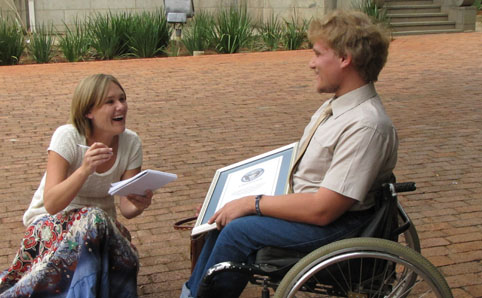 |
|
Volksblad journalist Christal-Liza Thomas interviewed Hermann van Heerden.
Photo: Amanda Tongha
|
He had to wait three months for the Guinness World Record office to verify his world-record attempt but it is now official. Kovsie-student Hermann van Heerden is a Guinness World Record holder.
On 01 February 2012 the B.Ed. Kovsie student proudly showed his certificate to Prof. Jonathan Jansen and others at the Bloemfontein Campus of the University of the Free State (UFS). In October 2011 Hermann, who was born with spina bifida, a developmental congenital disorder, wheeled himself into the record books by holding a stationary wheelie in his wheelchair for 10 hours and 1 second.
He achieved this record as part of celebrations marking a decade of existence for the Unit for Students with Disabilities (USD) at the UFS.
With the support of his fellow Kovsies, Hermann embarked on his record attempt on 11 October last year. He started at 03:15 and held his wheelie until 13:16.
The minimum time set for Hermann to achieve a Guinness World Record was four hours and he bettered this by six hours. During his attempt, the Kovsie student did not have any food or water and was not allowed a bathroom break.